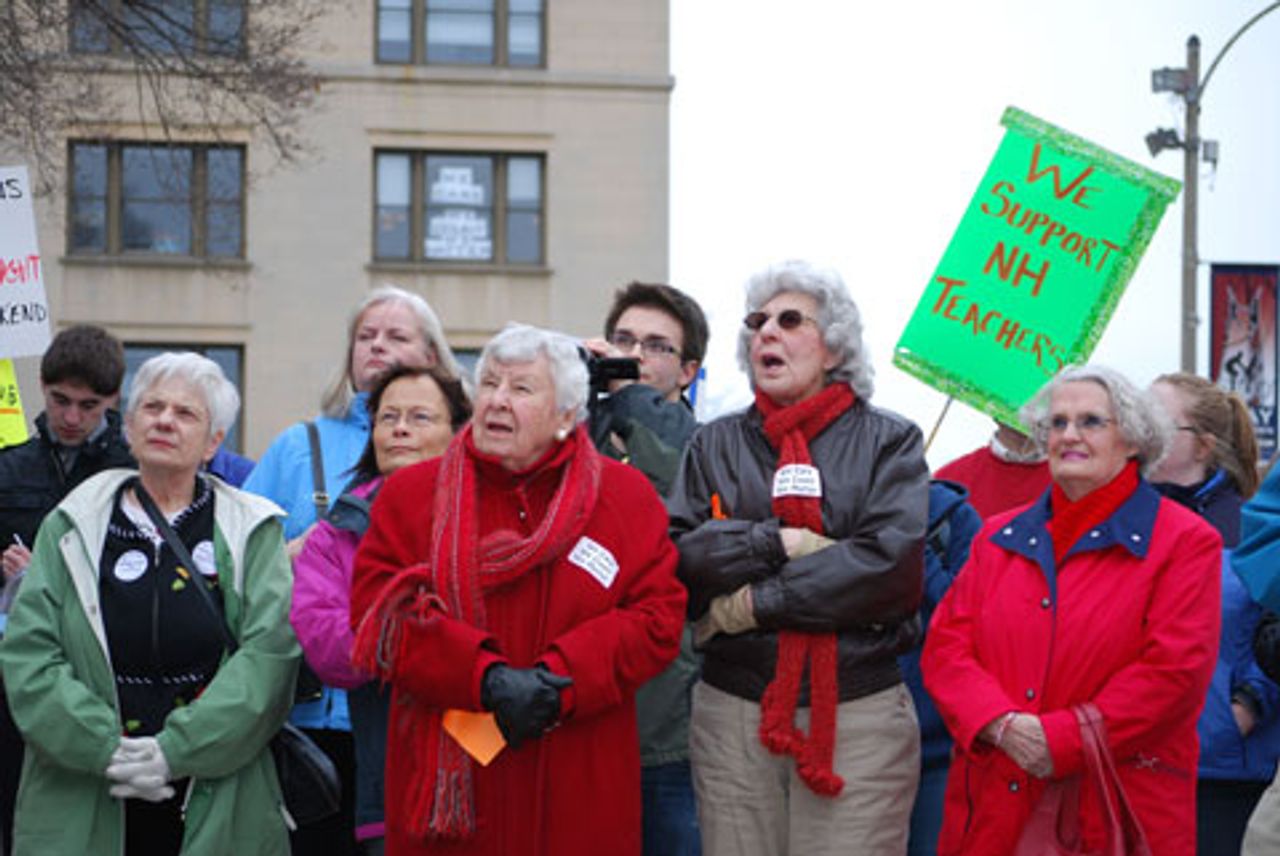Several thousand New Hampshire state workers and their supporters rallied at the State House in Concord on Thursday to protest a budget proposal that would make deep cuts to social programs and strip public employees of their collective bargaining rights if they do not accept drastic concessions.
 Section of the rally at the New Hampshire state house
Section of the rally at the New Hampshire state houseThe Republican-dominated House debated for five hours before approving the $10.2 billion budget in a 243-123 vote, with the majority of Democrats opposed. The proposal cuts spending for mental health programs, vocational training, consumer protection, domestic violence, child care, the disabled, mental health, alcohol treatment and college aid. The budget proposal now goes to the state Senate.
A companion bill passed on Wednesday would make public workers at-will employees—whose jobs and terms of employment are entirely at the discretion of the employer—if a union contract expires without workers submitting to demands for wage and benefit cuts. The move aims to slash state employee costs by $50 million. Governor John Lynch, a Democrat, says he opposes the measure.
Earlier on Thursday during the debate, opponents of the budget gathered in the gallery, shouting “Shame on You!” as the House prepared for a vote. As the crowd became more and more vocal, Republican House Speaker William O’Brien had police temporarily clear the gallery.
 Members of State Employees Association Local 1984
Members of State Employees Association Local 1984O’Brien told reporters that he was unmoved by the sentiments of the protesters. “The voices that speak to me are the taxpayers who say (the spending) is too much,” he said. One Republican representative argued that parents could make due without child care by swapping child care duties with their neighbors, “like my parents did.”
State employees and residents who stand to suffer from the budget measures addressed the crowd outside the Capitol building. Dr. Jeff Fetter, a psychiatrist, said that the $68 million in proposed cuts to mental health services would ration health care for the mentally ill.
“If this budget passes,” he said, “4,000 adults and 3,400 children will be discharged from care whether their psychiatrists think they are ready or not. That’s about half the system’s clients. We are not talking about the ‘worried well,’ but people with severe mental illness like schizophrenia.”
Jesse Welch, a 16-year-old recovering drug addict, asked those assembled, “Are we going to give everyone the opportunity to live free, or are we going to sit back, pass a state budget like this and just let people suffer until they die?”
State employee Jim Nall works as a nurse at Glenncliff Home for the Elderly. He spoke against the measure that would make state workers at-will employees. “We must have jobs in our state,” he told the crowd. “They need to provide decent wages and benefits if we want to keep more people from accessing the same services that this budget is chopping now.”
 A section of the teachers rally
A section of the teachers rallyUnion organizers speaking from the platform urged protesters to put their faith in the Democratic governor and legislators to beat back the budget cuts and anti-worker provisions of the budget. In a bit of political theater, individual Democrats who had voted against the budget were brought out on the Capitol steps one by one to polite cheers from the crowd.
In fact, Governor Lynch and Democratic state legislators have made it clear they stand for “fiscal responsibility,” only that the cuts need to be more reasonable. By contrast, the mood among the crowd—which represented some 139 organizations, including state workers’ unions and social advocacy groups—was dominated by a mood of defiance.
 Liz and Crystal came to support their friends and family
Liz and Crystal came to support their friends and family Liz and Crystal are not state workers themselves, but had come to the rally to support friends and family who stand to be affected by the budget cuts. “I think the entire budget is disgusting,” Liz said.
Bonnie Dodge is a student in human services at New Hampshire Technical Institute (NHTI). She told the WSWS, “I didn’t get into this field for the money. I want to be a social worker, but under this budget the cost of education will just go higher and higher. How can anyone afford it?
 Bonnie Dodge
Bonnie Dodge “According to people I’ve spoken to, teachers and staff at NHTI will take benefit cuts, pay cuts. Part of the bill would eliminate the union, even after workers offered to take pay cuts.”
Later in the afternoon, another round of protesters made their way to the capital, as hundreds of teachers traveled to Concord after schools were dismissed for the day. Parents and students joined teachers in a spirited demonstration, marching across Main Street to the beat of a brass band, carrying mostly homemade signs.
In addition to the measure that would make state workers at-will employees, protesters were particularly angered by a retrograde measure that would lower the age at which students can legally drop out of school to 16 years—while at the same time cutting programs to help young people find jobs.
 Hal Poselt (left) and Dan Magarian
Hal Poselt (left) and Dan Magarian Dan Magarian has been a teacher in Concord for 25 years. “Being a teacher used to be the only way to even get close to being middle class. Education, teaching is everything that holds our society together, and it’s falling apart.”
Dan’s friend, Hal Posselt, is a former high school guidance counselor who now works as an ESL (English as a second language) teacher with elementary students. “Students are being marginalized,” he said. “They can barely keep up, but now with these cuts it’s becoming impossible.”
Dan added, “Now they want to bring corporal punishment back to the classroom. They are basically slowly trying to do away with public education.”
Commenting on the Obama administration’s Race to the Top program, Hal said, “It’s basically a losing race. Everything is at risk.”
“Children are not machines,” said Dan. “This system is letting us down. They want to let kids drop out at 16, and they are cutting vocational training as well.”
Speaking from the platform, representatives from NEA New Hampshire provided no perspective to fight the onslaught on teachers’ and other workers’ rights, jobs and benefits. They lamented the Democrats’ losses in the 2010 Congressional mid-term elections and urged workers to support the Democrats in 2012.
